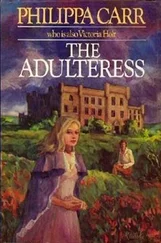I could not understand myself. The listlessness had dropped from me. Every morning when I awoke I was aware of an excitement.
“How many miles to Paris?” I would ask.
And it was wonderful to know the distance was diminishing.
I began to wonder about myself. How ill had I been since I could make this recovery?
Perhaps it had not really been that I was not well enough to go about meeting people and live a normal healthy life so much as that I did not want to.
And at last we saw the city of Paris in the distance.
I was overcome with exhilaration and impatience. The most exciting city in the world, I thought it. But that was because it contained Clarissa.
It was late afternoon when we arrived. I looked ahead to where the fading sunlight touched the turrets and spires. I saw the outline of the Palais de Justice and the belfreys, towers and gargoyles of Notre Dame.
We crossed a bridge and I felt the magical aura of the city embrace me.
I looked at Jeremy. A grim satisfaction showed on his face.
We had got so far. He had said many times that he was surprised how well we were going; and I told him that he was not really surprised at all. He knew as well as I did that if one was determined to succeed, one would; and we were going to bring Clarissa to England.
“We’ll find an inn for the night and we’ll go to the Marais district.”
Jacques said: “It should be Les Paons, Monsieur. It is the best for us.”
“Les Paons it shall be.”
I said: “First let us go to the house.”
“First to the inn,” said Jeremy. “We cannot go to the house ... travel-stained as we are. Look at the mud on your skirts. The horses are tired out. They hate this Paris mud.- It’s the worst mud in the world.”
I wanted to protest even though I realised he was right.
“We must go to the house,” I said.
Jacques shook his head.
“Better not to go out at night, Mademoiselle.”
I felt desperately frustrated, but I knew they were right.
The inn was decorated with the peacocks from which it took its name. It was comfortable and a room was found for me which looked down on the street. I stood at the window for a moment, watching the people pass by. It was almost impossible to conceal my impatience, but I knew I must wait.
We must present ourselves at the house as decorously as possible tomorrow morning.
This time tomorrow, I promised myself, I shall have Clarissa.
What an age that seemed! I wondered how I should get through the night. I was here ... in Paris ... I was on the threshold of success. And I had to get through these hours of darkness somehow before the morning.
We took supper in the inn parlour but I was too excited to eat. Jeremy was calm and tried to steady me, but I could concentrate on nothing. I was just looking for the time to pass.
I could not sleep that night. I sat at my window and looked down on the street. It was strange how its character changed as darkness fell. The well-dressed people were replaced by those of a different kind. I realised that Jeremy had been right when he had said that we should wait till morning.
I saw the beggars waiting there holding out their hands piteously to those who passed by. I saw a woman get out of a carriage with a young girl and take the girl into a house. The woman came out alone and drove away. Something about this reminded me of my own adventures as a simpleton in London. I knew that the girl had been taken to the house on an assignation and that the woman in the carriage had arranged it.
The incident brought back vividly to my mind that time when I had gone out to buy violets for my mother and had fallen in with Good Mrs. Brown.
Then I noticed a woman standing outside the house into which the girl had gone. A man came out; he was well dressed. The woman caught at his arm. He threw her off.
I saw a great deal that night, for there was no sleep for me. I did lie down for an hour or so but as sleep was impossible I rose and sat at the window.
It was evidently a house of ill fame opposite.
Then I saw a terrible thing. A child ran out of the house suddenly. She was half naked-without shoes and stockings; she just wore a short spangled shift. She ran as though terrified and as she reached the street a woman came out, seized her kicking and struggling and bore her back.
I saw the woman’s face briefly in the moonlight. It struck me as the most evil face I had ever seen.
I felt sick, for a terrible thought had come to me. Clarissa was in this city, this wicked city. I knew something of the wickedness of cities since I had come face to face with it in the cellar of Good Mrs. Brown.
I had been fortunate. Worse things could have happened to me.
I would take Clarissa home; I would care for her; I would love her.
I must get well and strong, for Clarissa needed me.
I would do it. I must. Clarissa needed me.
It was morning. I was dressed and ready. Excitement set the colour burning in my cheeks and none would guess I had had a sleepless night.
I was impatient for Jeremy to come. He was exactly on time but I could not keep still.
He smiled at me as we stepped into the street.
We came to the house where Carlotta had lived with Lord Hessenfield and Clarissa.
It was a grand house-tall and imposing.
We walked up the steps to the front porch. The concierge appeared.
Jeremy said: “This is Lady Hessenfield’s sister.”
The concierge surveyed me. She said: “Lady Hessenfield is dead.”
“Her daughter ...” I began.
The next words terrified me.
“She is not here any more.”
“Perhaps there is a servant ... Jeanne.”
“Madame Deligne would see you perhaps,” said the concierge.
“Oh, yes, please,” I cried fervently.
We were taken into a salon where the lady of the house received us.
Jeremy stated our reasons for being here and she answered in French, which I was able to follow.
Both Lord and Lady Hessenfield had died of some mysterious illness. It was a sort of plague, for a lady who had visited them, a Madame de Partiere, had also died of the same disease. There had been quite a scare at the time.
Jeremy said: “Lady Hessenfield had a daughter and it is this child whom we have come for. We want to take her back to her family.”
“Ah, yes,” said Madame Deligne. “There had been a young child.”
She wrinkled her brows. She had not heard what became of the child.
“What of Jeanne, the servant?”
“Monsieur, when we came here we brought our own servants.”
“And what happened to those who were already here?”
Madame Deligne lifted her shoulders. “They went to other houses, perhaps. We could not take them, we had our own.”
“Do you remember this Jeanne?”
Again she thought back. “A young woman ... oh, yes ... I remember her faintly. I think she went back to what she was doing before she came to the house.”
“And what of the child? Did you hear about the child?”
“No, I never heard about the child.”
Madame Deligne was friendly and apologetic, eager to help but it was clear that she had no more information to offer.
I shall never forget coming out of that house. Despair and misery enveloped me. We had come so far and not found her.
What should we do now?
Jeremy, who was a pessimist when we were getting on well, was now full of optimism.
“We have to find this Jeanne,” he said. “That’s all.”
“Where ... where ... ?”
“What do we know of her?”
“That she comes of a poor family and used to sell flowers.”
“Then we must question every flower seller in Paris.”
I was fearful; and yet Jeremy inspired me with hope.
“We must begin without delay,” I said.
Читать дальше








